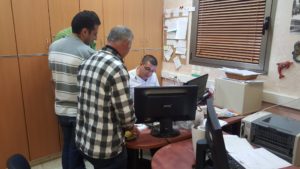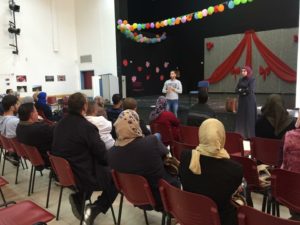Most Arab residents of east Jerusalem are permanent residents, entitled to full rights pertaining to health and welfare services. However, large numbers are not able to obtain these rights and benefits guaranteed them by law. In many cases, cultural and language barriers, in addition to the political complexities of Jerusalem, make it harder for people to navigate through bureaucracy.
The Atta’a Assistance Center for the Rights of East Jerusalem Residents, founded by the Jerusalem Foundation in 2004, is a grassroots capacity building program, empowering Palestinian residents of East Jerusalem to obtain legal rights. Residents learn to fill out and submit forms; they learn to draft and send letters; they learn to gather the necessary information and documentation, so that they can represent themselves in different offices. Atta’a also enables residents to know when a lawyer is required to sign and stamp documents, and when one is needed for more thorough care. It also works with government bodies to improve cultural competency and facilitate improved access to rights.
Atta’a is unique in that it specializes in cases found only in East Jerusalem. Because most residents have Permanent Resident status as opposed to Israeli citizenship, residents’ experiences are different. Laws are applied to them differently. Their approach to Israeli service-providing agencies is different. Atta’a rises to the challenge, and all its efforts are geared to meet the needs of East Jerusalem’s Palestinian residents.
Atta’a operates on three axes:
- Ongoing One-on-One Work with Residents in navigating government institutions such as the National Insurance Institute (NII), Interior Ministry and the Jerusalem Municipality. This includes assistance via telephone, Facebook, and Atta’a’s web site, as well as drop-in stations throughout east Jerusalem. Cases are taken care of by volunteers, overseen by the Project Coordinator and Rights Consultant.
- Mass Awareness Raising. Major avenues include its Facebook page , which is growing in popularity and engagement. Atta’a is also active on a number of major East Jerusalem Facebook pages, answering questions, writing and sharing relevant posts, and ‘getting the word out’. Atta’a also continues to develop its web site, with ever-expanding information pages on welfare, personal status and health care rights. The Atta’a web site is so popular that an Arabic-language Google search for ‘Israel Ministry of Interior’ lists Ata’a second, only behind the official government site. Atta’a also lectures to groups, from high schools to seniors, at least twice a month, covering both small and large issues, from making appointments on the Israeli government’s Hebrew-only online system to issues of status, welfare and health care rights, and more.
- Networking and Partnerships.Atta’a is completely independent, yet it works with everyone: municipal and national agencies, as well as non-profit advocacy/human rights organizations, some of which have difficulty in contacting the ‘establishment.’ The Atta’a staff also has connections with social workers in hospitals, HMOs, welfare offices and more, which enables residents to obtain rights and services.
Each year Atta’a reaches tens of thousands of Palestinian residents of East Jerusalem, enabling them to collectively gain millions of Shekels entitled to them by law.
You can read more details about Atta’a activities in the JICC blog, at the relevant category, in Atta’a Internet Site and also at the East Jerusalem Atta’a Facebook page.



